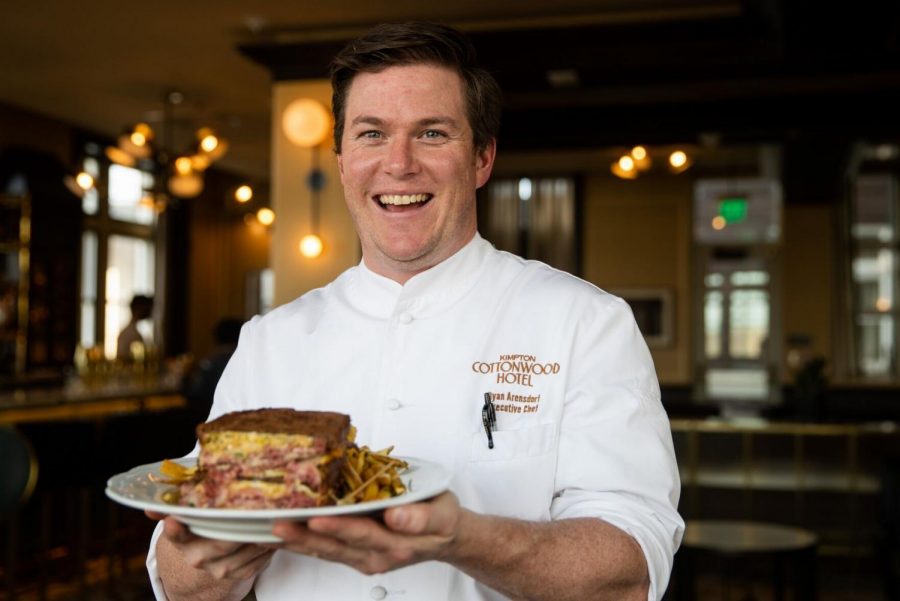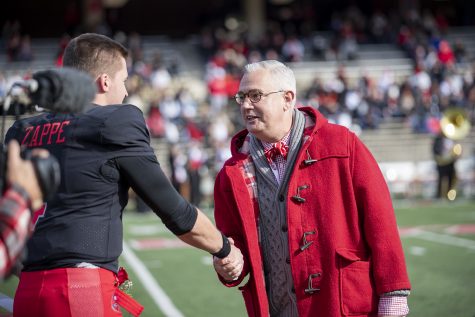You can now eat a Reuben at the hotel where Omahans (correctly) say it was invented
March 28, 2021
The chef at the newly opened Kimpton Cottonwood Hotel faced a pressing question.
Could the Reuben sandwich go home again?
The Reuben was born at the Blackstone Hotel on the very ground Chef Ryan Arensdorf’s kitchen now occupies, or so Omahans believe. (Misguided New Yorkers claim it, too.)
When developers revived the Blackstone as the Cottonwood last year, they embraced elements of the historic hotel’s past. The Reuben was one of them, and Arensdorf wanted his version to steal the spotlight from similar sandwiches at restaurants across town.
“It was basically mandatory that we take this sandwich seriously and try to put out the best Reuben that we can,” he said.
By most accounts so far, he got it right. The Reuben is the bestselling dish at the Cottonwood, Arensdorf said, and diners have given it rave reviews.
“It was amazing,” Omahan Rachele Smith said. “We took a Sunday school party with us, and they all thought it was among the best in Omaha.”
Arensdorf had help with the Reuben’s renaissance at the hotel from an inside source: Jay Kulakofsky, the great-great-great nephew of the sandwich’s creator.
In the 1920s or ‘30s, Kulakofsky’s Uncle Reuben regularly played late-night poker with a group of men in the Fern Room at the Blackstone. They always had food, with meat and bread provided by Bernard Schimmel, son of hotel owner Charles Schimmel.
Kulakofsky came up with a sandwich made of corned beef, Swiss cheese, sauerkraut, Thousand Island dressing and rye bread. The younger Schimmel executed Kulakofsky’s idea, and when it was a hit with the poker group, he wrote it down to make it again.
The elder Schimmel was so impressed that he put it on the hotel menu (“Reuben Sandwich, 40 cents,” a 1934 entry said).
Twirl this on your fork: Takeout Tuesday turns to spaghetti
Decades later, Arensdorf met Jay Kulakofsky when both worked at a Virginia resort, and they became friends.
Jay is a graduate of Burke High School and Northwestern University who works on the service side of the food and beverage industry.
He said he’s known about his Reuben legacy since childhood.
“I remember seeing a story on the local news about the Reuben, and my mom told me (about the connection) at the time,” he said.
Kulakofsky shared the sandwich’s history with Arensdorf, and when he saw the Cottonwood job listing, he encouraged his chef friend to apply.
“I talked about the specific type of Swiss cheese, the mixing of the drained kraut with the dressing, the type of bread, etc., and how it connected to the Blackstone Hotel,” he said.
Arensdorf took note, then set out to make a customized version for the Cottonwood.
“Everything is made from scratch,” he said. “We use prime brisket that’s brined for nine to 10 days and cooked overnight. We make the sauerkraut in-house.”
The Thousand Island dressing is also house-made “from a very powerful recipe,” Arensdorf said, and high-end Gruyere cheese replaces the Swiss.
The result, the chef said, is an extremely rich sandwich that contains up to eight ounces of meat. So he added house-made mustard to add acidity.
Chocolat Abeille is moving from Omaha’s Old Market to Bellevue
Interest in Reuben sandwiches has never waned in Omaha. Up to 50 restaurants serve them, and there’s even a fairly new business that focuses solely on making Reubens for home delivery.
Smith, the diner who praised the Cottonwood’s version, said she has had Reubens all over town. Those at Crescent Moon, which won The World-Herald’s Food Prowl in 2012, and Barrett’s Barleycorn Pub and Grill are among her favorites.
The Cottonwood Reuben has a complexity that others lack, and the restaurant has atmosphere, she said.
“Having it where it was invented, with the whole vibe,” makes it an experience, she said. “As soon as you step into the hotel, you feel like you are in a whole different era.”
As more reviews roll in, Reuben purists will probably have something to say about Arensdorf’s approach.
“The menu leads me to believe that it won’t be right,” one person messaged when we solicited feedback on social media from those who have tried the Cottonwood sandwich. “What — mustard?”
But the chef stands behind his work.
“There are always improvements you can make,” he said, “ (but) when we were taking pictures (for this story), I looked at it and said, ‘You can’t tell me that’s not the best in Omaha.’ “
Cafe Postale opens in historic former Burlington mail terminal
























